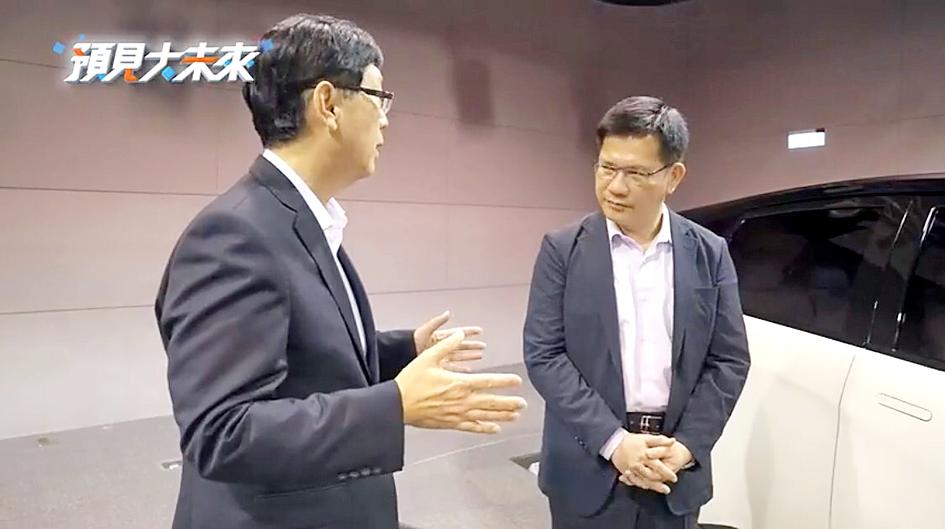Taiwan would manufacture about 90 percent of components used in the power systems of locally made electric vehicles by 2024, as the nation intensifies its efforts to penetrate the global electric vehicle (EV) market, Hon Hai Precision Industry Co (鴻海精密) said on Tuesday.
In a video released by Hon Hai, company chairman Young Liu (劉揚偉) told former minister of transportation and communications Lin Chia-lung (林佳龍) that he expects the local manufacturing sector to make about 90 percent of parts used by batteries, electric devices and power control solutions for Taiwanese-made EVs by the end of 2024.
It is unlikely that a shortage of raw materials for vehicle production worldwide would improve any time soon, so automakers should reconsider their development strategies to enhance efficiency, Liu said, adding that a high rate of self-sufficiency is one of the answers to persistent shortages.

Photo courtesy of the Dadushan Industrial Innovation Foundation
Hon Hai has invested in the development of solid-state batteries and lithium iron phosphate batteries for EVs, with the goal of rolling out a sample solid-state battery and starting commercial production by 2024.
In addition, Hon Hai and Taiwanese electric scooter maker Gogoro Inc (睿能創意) have set their sights on the development of a global exchange system for EV batteries.
Hon Hai has also started to produce smart cockpits for EVs by working with multinational auto manufacturer Stellantis NV through a joint investment of US$80 million.
Meanwhile, Foxtron Vehicle Technologies Co (鴻華先進), a joint venture between Hon Hai and Taiwanese automaker Yulon Motor Co (裕隆汽車), is pushing for EV development on the MIH Open Platform.
The platform provides about 50 percent of key EV components to its members and is seeking to raise that to more than 80 percent, with Hon Hai viewing it as the “Android of the EV industry,” Liu said.
To enhance the competitiveness of Taiwan’s EV industry, Liu said local manufacturers need to focus on semiconductor and software development.
Hon Hai on Wednesday said that it would integrate its third-generation semiconductor efforts with advanced silicon photonics technology for EV applications as well as robotics use.
Third-generation semiconductors are products such as silicon carbide and gallium nitride for EV use.
The firm would focus more on mobile robotics gadgets and aims to provide tailor-made robots through its, development platform, it said.

SELL-OFF: Investors expect tariff-driven volatility as the local boarse reopens today, while analysts say government support and solid fundamentals would steady sentiment Local investors are bracing for a sharp market downturn today as the nation’s financial markets resume trading following a two-day closure for national holidays before the weekend, with sentiment rattled by US President Donald Trump’s sweeping tariff announcement. Trump’s unveiling of new “reciprocal tariffs” on Wednesday triggered a sell-off in global markets, with the FTSE Taiwan Index Futures — a benchmark for Taiwanese equities traded in Singapore — tumbling 9.2 percent over the past two sessions. Meanwhile, the American depositary receipts (ADRs) of Taiwan Semiconductor Manufacturing Co (TSMC, 台積電), the most heavily weighted stock on the TAIEX, plunged 13.8 percent in

A wave of stop-loss selling and panic selling hit Taiwan's stock market at its opening today, with the weighted index plunging 2,086 points — a drop of more than 9.7 percent — marking the largest intraday point and percentage loss on record. The index bottomed out at 19,212.02, while futures were locked limit-down, with more than 1,000 stocks hitting their daily drop limit. Three heavyweight stocks — Taiwan Semiconductor Manufacturing Co (TSMC, 台積電), Hon Hai Precision Industry Co (Foxconn, 鴻海精密) and MediaTek (聯發科) — hit their limit-down prices as soon as the market opened, falling to NT$848 (US$25.54), NT$138.5 and NT$1,295 respectively. TSMC's

TARIFFS: The global ‘panic atmosphere remains strong,’ and foreign investors have continued to sell their holdings since the start of the year, the Ministry of Finance said The government yesterday authorized the activation of its NT$500 billion (US$15.15 billion) National Stabilization Fund (NSF) to prop up the local stock market after two days of sharp falls in reaction to US President Donald Trump’s new import tariffs. The Ministry of Finance said in a statement after the market close that the steering committee of the fund had been given the go-ahead to intervene in the market to bolster Taiwanese shares in a time of crisis. The fund has been authorized to use its assets “to carry out market stabilization tasks as appropriate to maintain the stability of Taiwan’s

In a small town in Paraguay, a showdown is brewing between traditional producers of yerba mate, a bitter herbal tea popular across South America, and miners of a shinier treasure: gold. A rush for the precious metal is pitting mate growers and indigenous groups against the expanding operations of small-scale miners who, until recently, were their neighbors, not nemeses. “They [the miners] have destroyed everything... The canals, springs, swamps,” said Vidal Britez, president of the Yerba Mate Producers’ Association of the town of Paso Yobai, about 210km east of capital Asuncion. “You can see the pollution from the dead fish.